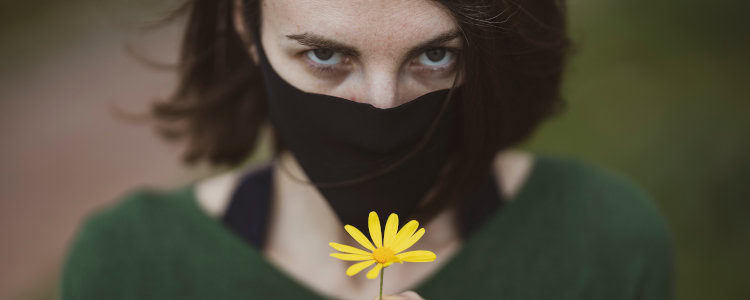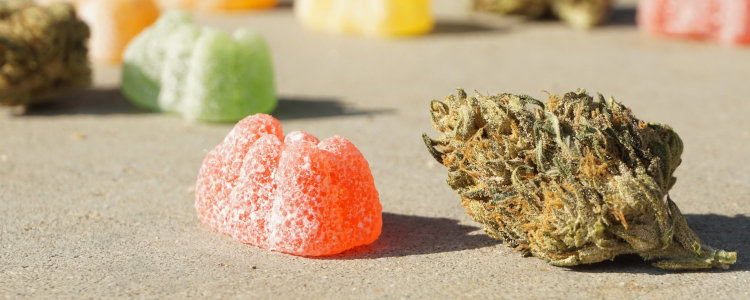In This Article
Asthma is a common condition, affecting nearly 26 million people in the U.S. Asthma can range in severity, with some people rarely being impacted and others having a serious change in their quality of life. Some people have asthma from a young age, while others may develop it later on.
Some people do turn to medical cannabis to treat asthma. While cannabis may not be a commonly recommended option for this condition, it is possible that it can help. This is due to certain components of cannabis that have anti-inflammatory and bronchodilation effects.
While it is possible that cannabis could help asthma, there are many different factors to consider. One of the most important is the method of consumption: while it’s rare that an edible or topical product would trigger asthma, the same can’t be said for smokable options.
There’s a lot to unpack in the relationship between asthma and cannabis. Still, the existing research does shine some light on the potential medical cannabis has in treating symptoms of the condition.
What is Asthma?

Asthma is a condition that affects the airways. Individuals with asthma may experience swelling and narrowing of their airways, which can restrict breathing. This condition is not currently considered curable, but there are treatment options that can help with symptom management.
Asthma symptoms are typically caused by exposure to a triggering substance (mold, pets, and smoke are some of the most common) or by completing a triggering activity (such as exercise). For individuals diagnosed with asthma, it’s important to learn about their biology and understand any triggers to minimize potential exposure in the future.
Symptoms of asthma are typically easy to identify. Possible symptoms include:
- Wheezing
- Shortness of breath
- Coughing
- Difficulty sleeping due to breathing problems
Did you know that there are different types of asthma? The different types of asthma are characterized by what they’re triggered by, such as exercise-induced asthma and occupational asthma. This is why it’s very important to understand an individual’s specific triggers.
There are a few different treatment options for asthma. Most people rely on inhalers to either prevent attacks or treat symptoms, but some individuals with more severe cases of asthma rely on oral steroids.
Individuals with asthma may be able to avoid some triggers, such as cats and dogs, but this isn’t always the case. For some, environmental allergens are unavoidable and may lead an individual to rely on their medication more heavily.
The possible limitations imposed on a person’s life by asthma depend on the specific type an individual has. If someone has exercise-induced asthma, they may struggle to do certain types of exercise, such as running. However, other factors, such as the weather, can also impact someone’s asthma. For those with exercise-induced asthma, cold weather may worsen symptoms.
Does Medical Marijuana Have Any Benefits for Asthma?

Some individuals with asthma turn to medical cannabis for symptom relief. While there hasn’t been much research into this topic, there are some reasons why individuals incorporate cannabis into their treatment regimen.
A 2020 study found that cannabis does have a bronchodilator effect, as well as an anti-inflammatory one.1 Because of these effects, it’s possible that cannabis could provide some symptom relief and potentially help individuals restore a healthy breathing pattern.
It’s possible that certain components of cannabis, referred to as terpenes, may also be helpful for those dealing with asthma symptoms. Seeking out cannabis products high in certain helpful terpenes, such as pinene, caryophyllene, or limonene, can be a good way to use cannabis intentionally and get as many benefits for treating asthma as possible.
Terpenes are naturally found in all plants. They’re the chemical compounds that give plants their smell and contribute to taste. Research has found that terpene exposure can have positive effects on individuals with asthma.2 It’s important to note that benefits were found when terpene exposure levels were low.
While medical marijuana can be an option for asthma symptom relief, it isn’t typically recommended as a long-term treatment approach. This may be in part due to the method of consumption. While cannabis edibles are widely available, many consumers choose to smoke cannabis, which could trigger an asthma attack rather than help alleviate symptoms.
The relationship between cannabis and asthma can be complicated and will take some time to untangle. There is a significant need for more research in this area, especially when it comes to understanding how smokable cannabis products can impact asthma.
The effects a user gets from cannabis can vary widely, and it isn’t possible to claim that medical marijuana will help alleviate asthma symptoms for all patients suffering from the condition. If you’re considering using medical cannabis for asthma symptom relief, consider speaking with your doctor about what the best options for you are.
Are There Any Risks or Complications for Asthma Sufferers?

There hasn’t yet been much research to understand how cannabis could negatively impact asthma. It’s likely that while cannabis may not be harmful for asthma, the method of consumption – particularly when inhaled – can have adverse effects.
Smoke is one of the most common asthma triggers, so it’s no surprise that smokable cannabis products have the potential to trigger symptoms. Smoking cannabis could not only begin an asthma attack but worsen symptoms. While it’s not possible to guarantee how someone will react to smoking cannabis, it is clear that inhaling smoke or being in the same space as others who are smoking can have adverse effects on the lungs.
Cannabis may have the potential to alleviate some asthma symptoms, but it’s not always that way. If you’re considering how to use cannabis to relieve discomfort caused by asthma, it’s best to avoid inhaled options, like smoking and vapes, in favor of edibles, tinctures, and any options that don’t directly impact the lungs. Your doctor may be able to provide you with more information that’s specific to your situation and help you make an informed decision.
What About Cannabis Allergies?

Some people are surprised to learn that it’s possible to be allergic to cannabis. Just as individuals can be allergic to pollen and certain flowers, cannabis is another potential allergen.3 Individuals with a cannabis allergy who are exposed to cannabis have the potential to develop symptoms similar to those from asthma, such as wheezing and difficulty breathing.
As with asthma, symptoms of a cannabis allergy can vary in severity and duration. Possible symptoms of cannabis allergy include:
- Itching
- Hives
- Wheezing
- Swelling
- Shortness of breath
There hasn’t been significant research to examine whether or not people living with asthma have a higher risk of a cannabis allergy. If you’ve experienced negative symptoms in the past after using or being exposed to cannabis, then it’s possible you could have a cannabis allergy.
When you’re unsure whether or not cannabis is the right choice for you, it’s best to do research and only make a decision after seeking help from a medical professional. In most cases where a cannabis allergy is present, it’s best to abstain rather than risk adverse effects.
What Cannabis Consumption Method is Best for Asthma Sufferers?

Inhalation methods, such as smoking and vaping, are not recommended as they have the potential to trigger asthma symptoms. Remember that when it comes to smoking weed and asthma, you don’t even have to be the one smoking – even secondhand smoke can be dangerous.
An edible product, infused beverage, or tincture is unlikely to trigger asthma symptoms. In fact, they may actually be able to improve symptoms through the plant’s anti-inflammatory properties.
How to Stay Safe When You Have Asthma

If you’re considering using cannabis for asthma, it’s best to do it as safely as possible. If you’ve never used cannabis before, it’s recommended to start with a small dose and then increase it in the future if needed.
Those with asthma should stay away from smokable products and use only edible or drinkable options. THC inhalers are another potential option that is less likely to trigger asthma symptoms (though these should only be used after consulting with your doctor).
If you’ve been exposed to cannabis and are having severe asthma symptoms, consider reaching out to your doctor or getting emergency medical care. It’s always best to be seen by a medical professional if you’re concerned about symptoms, especially when it comes to difficulty breathing.
Don’t be afraid to share your concerns, and make sure that you have a complete understanding of potential risks and benefits before introducing cannabis into your daily routine as an individual with asthma.
Weed and Asthma FAQs
There’s a lot that still needs to be learned about weed and asthma. However, there are answers to some of the most common questions.
Can secondhand weed smoke trigger asthma?
Yes, it is possible that secondhand weed smoke can trigger asthma. If you have severe asthma that’s been triggered in the past by smoke exposure, then it’s most likely best to avoid any smoke, regardless of the substance. Secondhand cannabis smoke can still have effects on an individual’s health, even though the person themselves isn’t consuming the substance.
Are THC inhalers good or bad?
THC inhalers are a fairly new option that may not be available in many dispensaries. Inhalers have the ability to quickly reach the lungs without the adverse effects that can come from smoke. Because of this, some individuals with asthma use THC inhalers and claim to get benefits from them.
Can RSO help with asthma?
RSO is known for lowering stress levels, which can help with asthma symptoms. When using RSO for asthma, it’s likely only a low dose will be needed.
Are edibles good for asthma?
While it isn’t possible to make definitive medical claims about cannabis and asthma, there is reason to believe that edibles could be beneficial for some individuals with the condition. When taken at the right time, edibles have the potential to reduce symptoms and help individuals breathe. If you’re going to be using medical marijuana for asthma, it’s important to do research and understand what all of your different options are.
Can CBD help with asthma?
CBD provides many of the same benefits that THC does. There hasn’t been much research focused specifically on asthma and CBD, but it’s believed that many of the same benefits that come from THC will also come from products high in CBD.
I’ve had a bad cannabis reaction in the past; do you think I will again?
If you’ve had an adverse reaction to cannabis previously, it’s possible that your asthma could be triggered again if the same consumption method is used. If you used a smokable product, you could try an edible option. However, it is recommended you consult with a qualified medical cannabis doctor before continuing your cannabis consumption to be as safe as possible.
References
1. Jarjou'i A, Izbicki G. Medical Cannabis in Asthmatic Patients. Isr Med Assoc J. 2020;22(4):232-235.
2. Kim T, Song B, Cho KS, Lee IS. Therapeutic Potential of Volatile Terpenes and Terpenoids from Forests for Inflammatory Diseases. Int J Mol Sci. 2020;21(6):2187. Published 2020 Mar 22. doi:10.3390/ijms21062187
3. Jackson B, Cleto E, Jeimy S. An emerging allergen: Cannabis sativa allergy in a climate of recent legalization. Allergy, Asthma & Clinical Immunology. 2020;16(1). doi:https://doi.org/10.1186/s13223-020-00447-9
The information in this article and any included images or charts are for educational purposes only. This information is neither a substitute for, nor does it replace, professional legal advice or medical advice, diagnosis, or treatment. If you have any concerns or questions about laws, regulations, or your health, you should always consult with an attorney, physician or other licensed professional.




